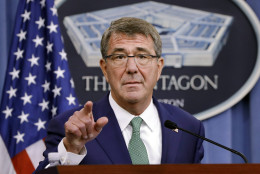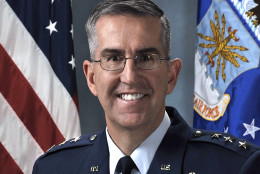Jack Reed
-
2017 may finally offer a peek of sunlight for another base realignment and closure cycle. Congressional resistance to BRAC is faltering, said Chris Preble, vice president for defense and foreign policy studies at the Cato Institute, and that may bring some fiscal savings to DoD.
February 27, 2017 -
Congress’ two defense policy committees were set to meet Thursday to consider whether retired Gen. James Mattis should be the next secretary of Defense, something both houses of Congress will have to approve since his confirmation would require the suspension of a federal law that demands military officers be out of uniform for seven years before they become the military’s civilian boss.
January 12, 2017 -
The White House wants nearly $12 billion to keep extra troops in Afghanistan and to continue the fight against the Islamic State. Some members of Congress think the request isn't enough.
November 11, 2016 -
President Barack Obama's nominee to take charge of U.S. Strategic Command told the Senate Armed Forces Committee that the Pentagon needs to double down on its strategic advantage in space and cyberspace to stay ahead of its adversaries.
September 23, 2016 -
Former military officials are trying to keep the Missile Defense Agency director a three or four star general.
July 08, 2016 -
Sen. John McCain’s amendment to add $18 billion to the Defense budget, increase the military pay raise and stop cuts to the Army and Marine Corps failed passage by four votes today.
June 09, 2016 -
Senate Armed Services Chairman John McCain (R-Ariz.) will offer an amendment to stop cuts to the Army and increase the defense budget when the NDAA goes to the floor next week.
May 19, 2016 -
The Senate version of the NDAA gets rid of the undersecretary of defense for acquisition, technology and logistics and cuts Senior Executive Officer staff by 25 percent.
May 13, 2016 -
Leaders of the Senate Armed Services Committee intend to push legislation promoting U.S. Cyber Command to a full combatant command. CYBERCOM's current commander agrees it's time to do so.
April 06, 2016 -
Congressional leaders are calling for bipartisan efforts to raise spending caps, to keep Defense funded and also provide government services that so many Americans rely on for education, health and employment.
October 08, 2015 -
House and Senate negotiators finally shook hands Tuesday on a defense authorization bill both parties generally support and would enact some of the most sweeping and aggressive changes to the military’s personnel and acquisition systems in several decades.
September 30, 2015 -
Defense Secretary Chuck Hagel's decision to resign Monday has produced plenty of speculation about his successor. Military experts retired Maj. Gen. Arnold Punaro and Jim Thomas of the Center for Strategic and Budgetary Assessments said the new DoD secretary will likely lobby Congress for more money to deal with new threats.
November 26, 2014











